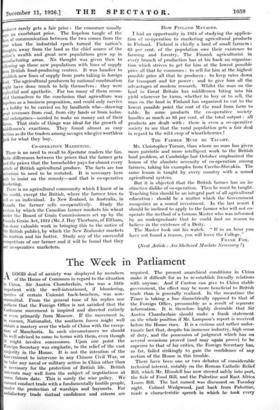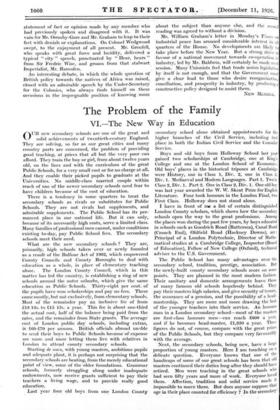The Week in Parliament GOOD deal of anxiety was displayed
by members of the House of Commons in regard to the situation In China. Sir Austen Chamberlain, who was a little Impatient with the well-intentioned, if blundering, queries of certain Unionist back-benchers, was non- committal. From the general tone of his replies one gathers that the Foreign Office is not satisfied that the Cantonese movement is inspired and directed entirely or even primarily from Moscow. If the movement is, In essence, Nationalist, the southern forces might well obtain a mastery over the whole of China with the excep- tion of Manchuria. In such circumstances we should be well advised to come to terms with them, even though it might involve concessions. Upon one point the Foreign Secretary was emphatic, to the relief of the vast Majority in the House. It is not the intention of the Government to intervene in any Chinese Civil War, or to take any naval or military action in China other than Is necessary for the protection of British life. British Interests may well form the subject of negotiations at some future date. This is surely the wise policy. We cannot conduct trade with a fundamentally hostile people, under the protection of warships and bayonets. For satisfactory trade mutual confidence and esteem are required. The present anarchical conditions in China make it difficult for us to re-establish friendly relations with anyone. And if Canton can give to China stable government, the effect may be more beneficial to British trade than is generally realized. In the meantime the Times is taking a line diametrically opposed to that of the Foreign Office, presumably as a result of separate information. It is therefore highly desirable that Sir Austen Chamberlain should make a frank statement on the whole position if Mr. Lampson's report is received before the House rises. It is a curious and rather unfor- tunate fact that, despite his immense industry, high sense of duty, and the possession of judgment which has on several occasions proved (and may again prove) to be superior to that of his critics, the Foreign Secretary has, so far, failed strikingly to gain the confidence of any section of the House in this trouble.
There have been one or two debates of considerable technical interest, notably on the Roman Catholic Relief Bill, which Mr. Blundell has now steered safely into port, the Sale of Food Bill, and the Palestine and East Africa Loans Bill. The last named was discussed on Tuesday night. Colonel Wedgwood, just back from Palestine, made a characteristic speech in which he took every statement of fact or opinion made by any member who had previously spoken and disagreed with it. It was vain for Mr. Ormsby-Gore and Mr. Graham to leap to their feet with denials or explanations. On Colonel Wedgwood swept, to the enjoyment of all present. Mr. Grenfell, who speaks with great force and lucidity, delivered a' typical " city " speech, punctuated by " Hear, hears " from Sir Fredric Wise, and groans from that stalwart. Imperialist, Mr. Ramsdell.
An interesting debate, in which the whole question of British policy towards the natives of Africa was raised, closed with an admirable speech by the Under-Secretary for the Colonies, who always finds himself on these occasions in the impregnable position of knowing more about the subject than anyone else, and the second reading was agreed to without a division.
Mr. William Graham's letter in Monday's Times on industrial peace has aroused considerable interest in all quarters of the House: No developments arc likely to take place before the New Year. But a strong drive in favour of a national movement towards co-operation in industry, led by Mr. Baldwin; will certainly be made next session. Many Unionists feel that trade union legislation by itself is not enough, and that the Government must give a clear lead to those who desire reorganization, conciliation, and prosperity in industry, by producing a constructive policy designed to assist them.
NEW MEMBER.















































 Previous page
Previous page